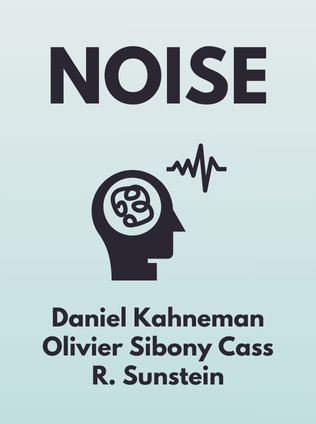
Noise
A Flaw in Human Judgment
By Daniel Kahneman, Olivier Sibony, Cass R. Sunstein
Published 05/2021
Noise: Improving Decision Making through Noise Reduction
About the Author
Daniel Kahneman is the Eugene Higgins Professor of Psychology at Princeton University and a Professor of Public Affairs at the Woodrow Wilson School of Public and International Affairs. He is a Nobel Prize winner in Economic Sciences and the author of the New York Times bestseller Thinking, Fast and Slow. Kahneman is a member of the American Academy of Arts and Sciences and the National Academy of Sciences. His work is highly influential in the fields of psychology and economics.
Main Idea
In Noise: Improving Decision Making through Noise Reduction, Daniel Kahneman, Olivier Sibony, and Cass R. Sunstein explore the concept of "noise" in human judgment and decision-making. They define noise as the variability in judgments that should be identical and offer practical strategies for reducing noise to improve decision quality across various sectors, including medicine, business, education, and government.
Table of Contents
- Introduction
- Finding Noise
- A Practical Process for Improving Judgments
- Decision Hygiene
- Judgment Guidelines
- Shared Scale Grounded in an Outside View
- Structuring Complex Judgments
- Mediating Assessments Protocol (MAP)
Introduction
Humans are inherently flawed in their ability to make perfect decisions. This imperfection manifests as both bias and noise. While much attention has been given to bias, the authors argue that noise is equally detrimental and more prevalent than we realize. By understanding and addressing noise, we can make more consistent and fair decisions.
"Wherever there is judgment, there is noise—and more of it than you think." – Daniel Kahneman
Noise refers to the variability in judgments that should ideally be the same. For example, different judges might give different sentences for similar crimes, and doctors might diagnose the same condition differently. This inconsistency is not due to bias but to noise, which can significantly affect decision-making in various fields.
Finding Noise
Noise is prevalent in many areas of decision-making. For example, judicial discretion allows judges to consider various factors in sentencing, but studies have shown significant variability in sentences for similar crimes. This noise undermines the fairness of the judicial system and highlights the need for noise reduction strategies.
"Sentences ranged widely for the same crimes by a factor of ten years and more." – Daniel Kahneman
The authors highlight the work of Judge Marvin Frankel, who exposed the noise in criminal sentencing through his groundbreaking research. He found that sentences for the same crimes could vary dramatically, leading to calls for reforms to reduce this noise and make sentencing fairer.
- Judicial sentencing variability demonstrates the impact of noise.
- Noisy decisions can lead to unfair outcomes.
This variability in judgments extends beyond the judicial system to areas such as corporate customer service, human resources, forensic science, and more. The authors emphasize that wherever there is judgment, there is noise, and it often goes unnoticed. Recognizing the prevalence of noise is the first step towards addressing it.
A Practical Process for Improving Judgments
The authors introduce the concept of "decision hygiene," a set of practices designed to reduce noise and improve decision quality. Decision hygiene includes strategies such as judgment guidelines, shared scales, structuring complex judgments, and the mediating assessments protocol (MAP).
Sign up for FREE and get access to 1,400+ books summaries.
You May Also Like
The Subtle Art of Not Giving a F*ck
A Counterintuitive Approach to Living a Good Life
By Mark MansonRich Dad Poor Dad
What the Rich Teach Their Kids About Money - That the Poor and Middle Class Do Not!
By Robert T. KiyosakiHow To Win Friends and Influence People
The All-Time Classic Manual Of People Skills
By Dale CarnegieFreakonomics
A Rogue Economist Explores the Hidden Side of Everything
By Steven D. Levitt and Stephen J. Dubner



















